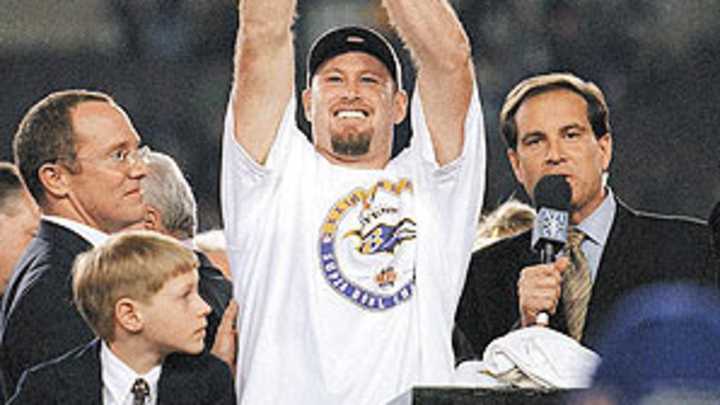Why it's OK for QBs to be Dilfer


With a cap-tip to Brad Johnson, perhaps the most vilified champion quarterback in history is Trent Dilfer of the 2000 Ravens.
Dilfer was little more than a hand-off machine while quarterbacking Baltimore in the playoffs. He wasn't even the team's No. 1 quarterback: Tony Banks took most of the team's snaps that year, before ceding the gig to Dilfer in October.
Johnson, meanwhile, was the journeyman who quarterbacked the Super Bowl champion 2002 Buccaneers in the playoffs.
Neither is headed to the Hall of Fame. And we realize each was buoyed by two of the best defenses of our time: the 2000 Ravens surrendered the fewest points of any team in the 16-game era (165), and the 2002 Bucs were paced by the best pass defense of the past 21 years (48.4 Defensive Passer Rating). It's a remarkable figure in the pass-happy 21st century.
So we get that part. These guys probably wouldn't have won without shutdown defenses.
But shutdown defenses don't win games all by themselves, either. As ColdHardFootballFacts.com readers know, you simply do not win playoff games consistently with bad play out of the quarterback position. So we don't get the hating on these two guys, especially Dilfer.
First, Dilfer can use his Super Bowl ring like a brass knuckle to knock out the knuckleheads who don't realize what he did in the playoffs.
Second, he serves as a blueprint for future inexperienced or second-tier quarterbacks who are paired with shutdown defenses ... like Jets rookie Mark Sanchez, for example. Sure, Sanchez was cautiously brilliant last weekend and looked more like CHFF hero Bart Starr than anyone in New York's beatdown of the Bengals. He completed 12 of 15 passes for 182 yards, one touchdown, no interceptions, a spectacular 139.4 passer rating, and repeatedly punctured the Cincy defense with big plays.
In the years ahead, Sanchez might prove to be one of the best QBs in the game. The Jets are certainly banking on it. But for now, he's still an inexperienced rookie. And no rookie quarterback has ever won a Super Bowl.
So in the days ahead, as the competition gets tougher, the Jets coaching staff could do worse than to "Dilfer-ize" Sanchez, to use the word expressed by reporter Paul Daugherty last week in an interview with us about Carson Palmerin SI.com and in his own paper, the Cincinnati Enquirer.
Third, Dilfer's effort in the 2000 postseason is completely underappreciated. The truth is he played rock-solid championship-caliber football, despite the belief to the contrary. Here's a look at Dilfer's stat line in Baltimore's four-game Super Bowl-winning playoff run.
• 35 of 73, 47.9, 590 yards, 8.1 YPA, 3 TD, 1 INT, 83.7 passer rating
The average pigskin pundit would look at those numbers and see few pass attempts (18.3 per game), a poor completions percentage and just three touchdown passes.
We see championship football.
Here's why:
One, Dilfer struck downfield effectively, punctuating Baltimore's conservative run-first strategy with long-ball strikes in a game plan right out of the 1960s. His completion percentage was very poor. That's for sure. But the fact he still averaged a champion-caliber 8.1 YPA despite that low completion percentage tells us he was getting the ball down field very effectively.
In fact, the more telling indicator is his spectacular 16.9 yards per completion. It's a phenomenal number. Baltimore's offensive game plan in the 2000 postseason might have been conservative. But there was nothing conservative about that passing strategy: challenge defenses and make big plays.
Tight end Shannon Sharpe played the biggest role, catching a 58-yard touchdown in the wild-card win over Denver and hauling in a 56-yard reception the following week at Tennessee. Then he scored a 96-yard TD in the AFC title game against the Raiders. It's the longest pass completion in NFL postseason history. And, of course, Dilfer lobbed a perfect seam-splitting strike to Brandon Stokley for a 38-yard TD in Baltimore's Super Bowl win over the Giants.
Two, Dilfer did the single most important thing any quarterback can do in the playoffs: he did not make mistakes. Dilfer threw just one interception in four playoff games. The one pick, and the 1.4 percent INT rate, both scream championship-caliber football.
In an offense in which every mistake would have been magnified, and in a playoff environment where INTs absolutely kill the teams that throw them, Dilfer was nearly perfect. (Each playoff INT, as CHFF readers know, reduces a team's chances of winning by about 20 percentage points; teams that threw more picks in the wild-card round this year went 0-4).
Sanchez and the Jets face a similar road as the one Dilfer and the Ravens had to travel in 2000. Both played with the top shut-down defenses in football. Both will have to win on the road to reach the Super Bowl: the Jets won at Cincinnati last week and they travel to San Diego this weekend, though they do have an outside shot of hosting the AFC title game if both they and the Ravens pull off upsets here in the divisional round. Both quarterbacks will primarily serve has hand-off machines for run-first offenses. Sanchez attempted 15 passes last week, while handing the ball off 36 times.
But by Feb. 7, if he follows the Dilfer blueprint, Sanchez might also be able to call himself a champion. And like Dilfer, he will have nothing to be ashamed of.
